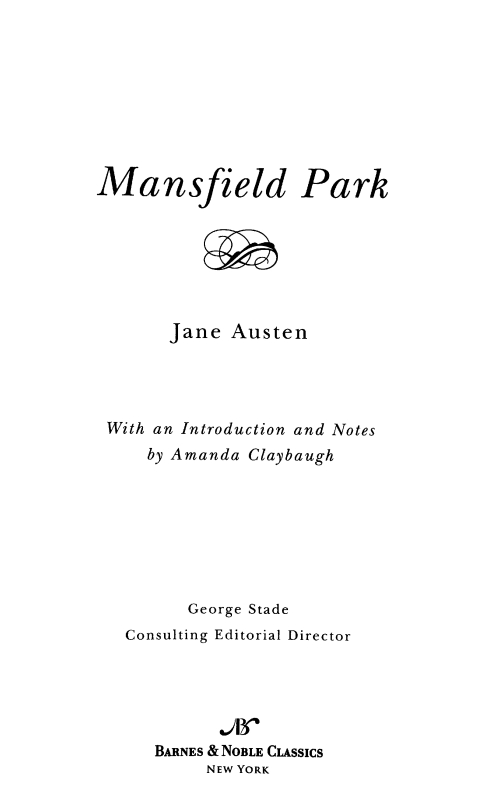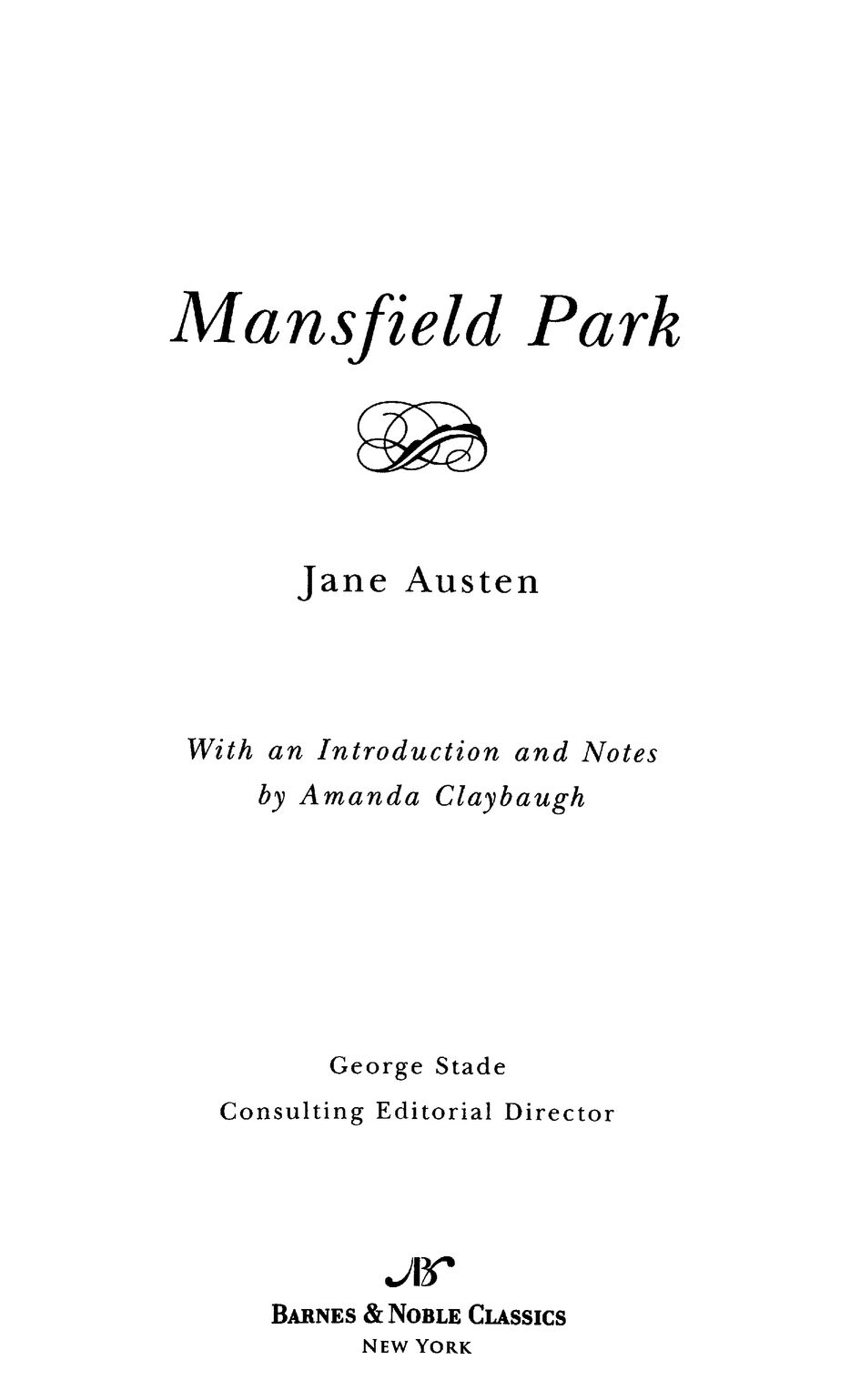Mansfield Park (Barnes & Noble Classics Series)
Read Mansfield Park (Barnes & Noble Classics Series) Online
Authors: Jane Austen

BOOK: Mansfield Park (Barnes & Noble Classics Series)
3Mb size Format: txt, pdf, ePub

Table of Contents
From the Pages of
Mansfield Park
Mansfield Park

‘Give a girl an education, and introduce her properly into the world, and ten to one but she has the means of settling well, without further expense to anybody.’ (page 6)
‘An engaged woman is always more agreeable than a disengaged. She is satisfied with herself. Her cares are over, and she feels that she may exert all her powers of pleasing without suspicion. All is safe with a lady engaged; no harm can be done.’
(page 40)
The politeness which she had been brought up to practise as a duty made it impossible for her to escape; while the want of that higher species of self-command, that just consideration of others, that knowledge of her own heart, that principle of right which had not formed any essential part of her education, made her miserable under it. (page 80)
‘Oh, do not attack me with your watch. A watch is always too fast or too slow. I cannot be dictated to by a watch.’ (page 84)
‘A clergyman has nothing to do but to be slovenly and selfish—read the newspaper, watch the weather, and quarrel with his wife. His curate does all the work, and the business of his own life is to dine.’ (page 97)
‘Where an opinion is general, it is usually correct.’ (page 97)
‘There seems something more speakingly incomprehensible in the powers, the failures, the inequalities of memory, than in any other of our intelligences. The memory is sometimes so retentive, so serviceable, so obedient; at others, so bewildered and so weak; and at others again, so tyrannic, so beyond control!’ (pages 180-181)
‘A large income is the best recipe for happiness I ever heard of. It certainly may secure all the myrtle and turkey part of it.’ (page 184)
‘Human nature needs more lessons than a weekly sermon can convey.’ (page 215)
To her, the cares were sometimes almost beyond the happiness; for, young and inexperienced, with small means of choice, and no confidence in her own taste—the “how she should be dressed” was a point of painful solicitude. (page 220)
‘A sermon, well delivered, is more uncommon even than prayers well read.’ (page 295)
She saw nobody in whose favour she could wish to overcome her own shyness and reserve. The men appeared to her all coarse, the women all pert, everybody underbred. (page 343)
The indignities of stupidity, and the disappointments of selfish passion, can excite little pity. (page 403)


Published by Barnes & Noble Books
122 Fifth Avenue
New York, NY 10011
122 Fifth Avenue
New York, NY 10011
Mansfield Park
was first published in three volumes in 1814
.
was first published in three volumes in 1814
.
Published in 2004 by Barnes & Noble Classics with new Introduction,
Notes, Biography, Chronology, Inspired By, Comments & Questions,
and For Further Reading.
Notes, Biography, Chronology, Inspired By, Comments & Questions,
and For Further Reading.
Introduction, Notes, and For Further Reading
Copyright © 2004 by Amanda Claybaugh.
Note on Jane Austen, The World of Jane Austen and
Mansfield Park,
Inspired by
Mansfield Park,
and Comments & Questions
Copyright © 2004 by Barnes & Noble, Inc.
Mansfield Park,
Inspired by
Mansfield Park,
and Comments & Questions
Copyright © 2004 by Barnes & Noble, Inc.
All rights reserved. No part of this publication may be reproduced or
transmitted in any form or by any means, electronic or mechanical,
including photocopy, recording, or any information storage and
retrieval system, without the prior written permission of the publisher.
transmitted in any form or by any means, electronic or mechanical,
including photocopy, recording, or any information storage and
retrieval system, without the prior written permission of the publisher.
Barnes & Noble Classics and the Bames & Noble Classics
colophon aretrademarks of Barnes & Noble, Inc.
colophon aretrademarks of Barnes & Noble, Inc.
Mansfield Park
ISBN-13: 978-1-59308-154-6 ISBN-10: 1-59308-154-5
eISBN : 978-1-411-43265-9
LC Control Number 2004102767
Produced and published in conjunction with:
Fine Creative Media, Inc.
322 Eighth Avenue
New York, NY 10001
Michael J. Fine, President and Publisher
Printed in the United States of America
QM
7 9 10 8 6
Jane Austen

The English novelist Jane Austen was born December 16, 1775, the seventh of eight children, in the Parsonage House of Steventon, Hampshire, where she spent her first twenty-five years. During her brief lifetime Austen witnessed political unrest, revolution, war, and industrialization, yet these momentous events are not the central subjects of her finely focused novels. Rather, Austen wrote of her immediate experience: the microcosm of the country gentry and its class-conscious insularity. Jane’s father, the Reverend George Austen, was the erudite country rector of Steventon, and her mother, Cassandra (née Leigh), was descended from an aristocratic line of learned clergymen. By no means wealthy, the Austens nonetheless enjoyed a comfortable, socially respectable life, and greatly prized their children’s education.
Jane and her beloved elder (and only) sister, Cassandra, were schooled in Southampton and Reading for a short period, but most of their education took place at home. Private theatrical performances in the barn at Steventon complemented Jane’s studies of French, Italian, history, music, and eighteenth-century fiction. An avid reader from earliest childhood, Jane began writing at age twelve, no doubt encouraged by her cultured and affectionate family. Indeed, family and writing were her great loves; despite a fleeting engagement in 1802, Austen never married. Her first two novels, “Elinor and Marianne” and “First Impressions,” were written while at Steventon but never published in their original form.
Following her father’s retirement, Jane moved in 1801 with her parents and sister to Bath. That popular watering hole, removed from the country life Jane preferred, presented the sociable young novelist with a wealth of observations and experience that would later emerge in her novels. Austen moved to Southampton with her mother and sister after the death of her father in 1805. Several years later the three women settled in Chawton Cottage in Hampshire, where Austen resided until the end of her life. She relished her return to the countryside and, with it, a renewed artistic vigor that led to the revision of her early novels.
Sense and Sensibility,
a reworking of “Elinor and Marianne,” was published in 1811, followed by
Pride and Prejudice,
a reworking of “First Impressions,” two years later.
Sense and Sensibility,
a reworking of “Elinor and Marianne,” was published in 1811, followed by
Pride and Prejudice,
a reworking of “First Impressions,” two years later.
Austen completed four more novels
(Mansfield Park, Emma, Northanger Abbey,
and
Persuasion)
in the Chawton sitting room. Productive and discreet, she insisted that her work be kept secret from anyone outside the family. All of her novels were published anonymously, including the posthumous release, thanks to her brother Henry, of
Northanger Abbey
and
Persuasion.
(Mansfield Park, Emma, Northanger Abbey,
and
Persuasion)
in the Chawton sitting room. Productive and discreet, she insisted that her work be kept secret from anyone outside the family. All of her novels were published anonymously, including the posthumous release, thanks to her brother Henry, of
Northanger Abbey
and
Persuasion.
Other books
Amber Morn by Brandilyn Collins
Explorer X Alpha by LM. Preston
Simple Intent by Linda Sands
From the Ashes (Force of Nature Book 1) by Amber Lynn Natusch
Dying to Run by Cami Checketts
A Midnight Dance by Lila Dipasqua
Broken by Kelly Elliott
The Dark Stranger: A Sharon Brown Erotic Romance by Robertson, Kathleen
April Raintree by Beatrice Mosionier